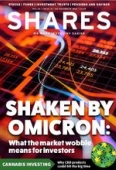Archived article
Please note that tax, investment, pension and ISA rules can change and the information and any views contained in this article may now be inaccurate.
Don’t panic in the face of Omicron sell-off

The FTSE 100 had its worst day of 2021 on 26 November as news of the Omicron variant spooked investors.
The sell-off in UK markets was matched around the globe as investors reacted to the imposition of travel restrictions and the potential for future lockdowns to contain the spread of what could be a more infectious form of Covid-19.
We look at all the details of what is happening on the markets and what might happen next in extended special coverage in our news section this week.
It is important not to panic when there is an increase in market volatility. In essence, we were probably due a bit of a correction. The markets’ recovery from their pandemic lows has been impressive if patchy so the latest move lower should be seen in that context.
It just so happened that a fresh development in the Covid-19 pandemic rather than a geopolitical event or a rapid increase in interest rates has been the catalyst for selling.
We still don’t know how serious Omicron is, and if this is a speed bump for the markets or something more serious, but either way acting in haste is only likely to lead to regret.
Assuming you have no plans to tap into your investment pot for cash in the short term, then staying invested is almost always the right option.
At the margins, you might consider selling some more speculative investments in your portfolio, should you have any.
This would both reduce your exposure to risk but also provide you with some cash to take advantage of opportunities to buy high quality stocks at a lower price should there be extended weakness in the markets.
If you are invested mainly in funds, it’s very likely their managers will be reacting in just the same way.
If instead you start selling out of everything and crystallising any losses, there is a risk you do so at the bottom of the market and miss out on any recovery.
It is a well-worn market adage for a reason that time in the markets beats timing the markets.
We often highlight this study, which is continually being updated, but the details are sufficiently compelling that they bear repeating.
Asset manager BlackRock found that if you had invested a hypothetical $100,000 in the S&P 500 index of US stocks between 1 January 2001 and 31 December 2020 you would be sitting on $424,760 if you stayed invested but by missing just the best five days that number dropped to $268,277.
At the time of writing there were a lot of companies which had fallen by high single digit or low double digits last Friday, but which had only recovered by a small amount on the following Monday. If you have a long-term view of the markets, now might be a good time to pick up a pre-Christmas bargain.

Important information:
These articles are provided by Shares magazine which is published by AJ Bell Media, a part of AJ Bell. Shares is not written by AJ Bell.
Shares is provided for your general information and use and is not a personal recommendation to invest. It is not intended to be relied upon by you in making or not making any investment decisions. The investments referred to in these articles will not be suitable for all investors. If in doubt please seek appropriate independent financial advice.
Investors acting on the information in these articles do so at their own risk and AJ Bell Media and its staff do not accept liability for losses suffered by investors as a result of their investment decisions.

 magazine
magazine








